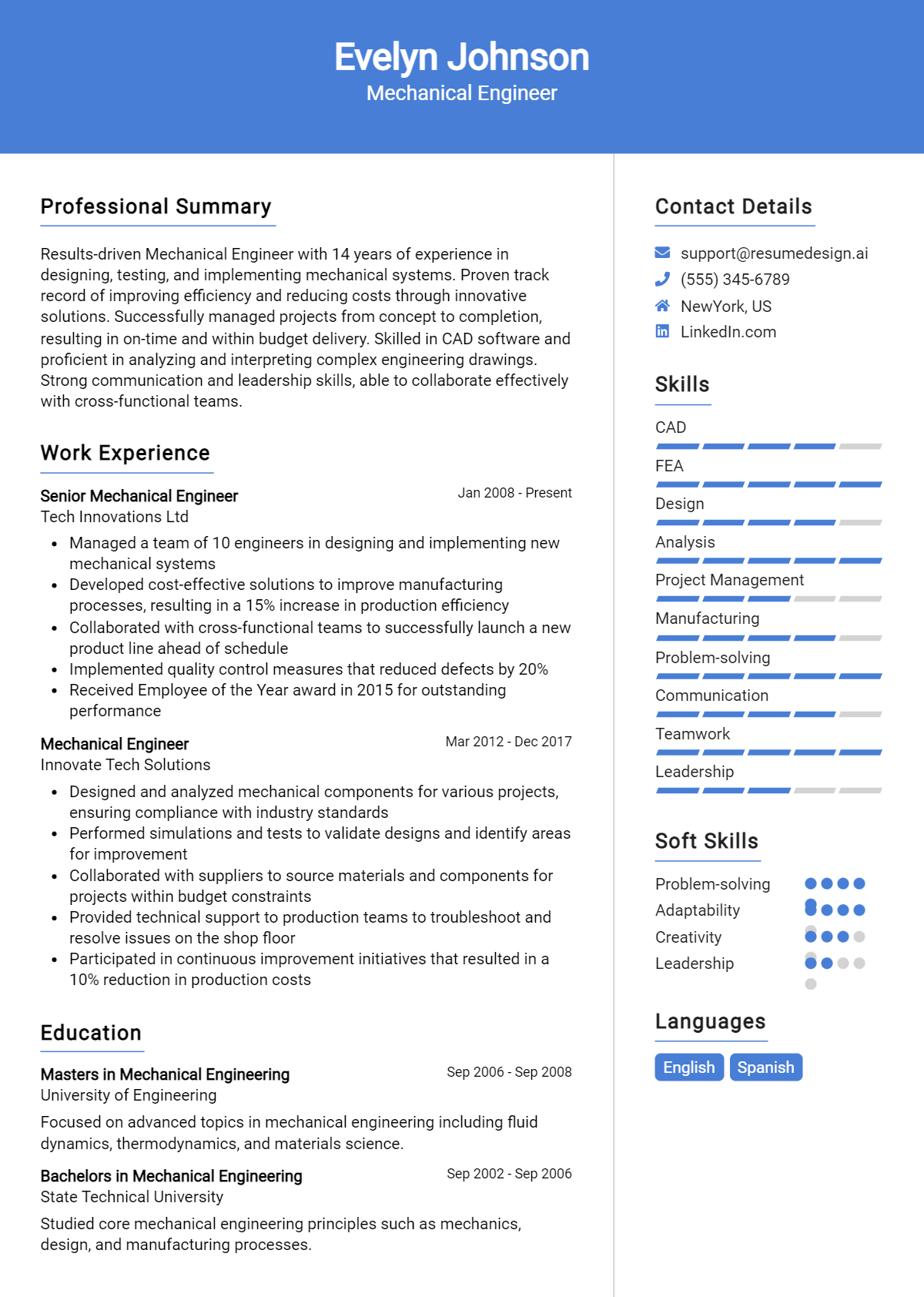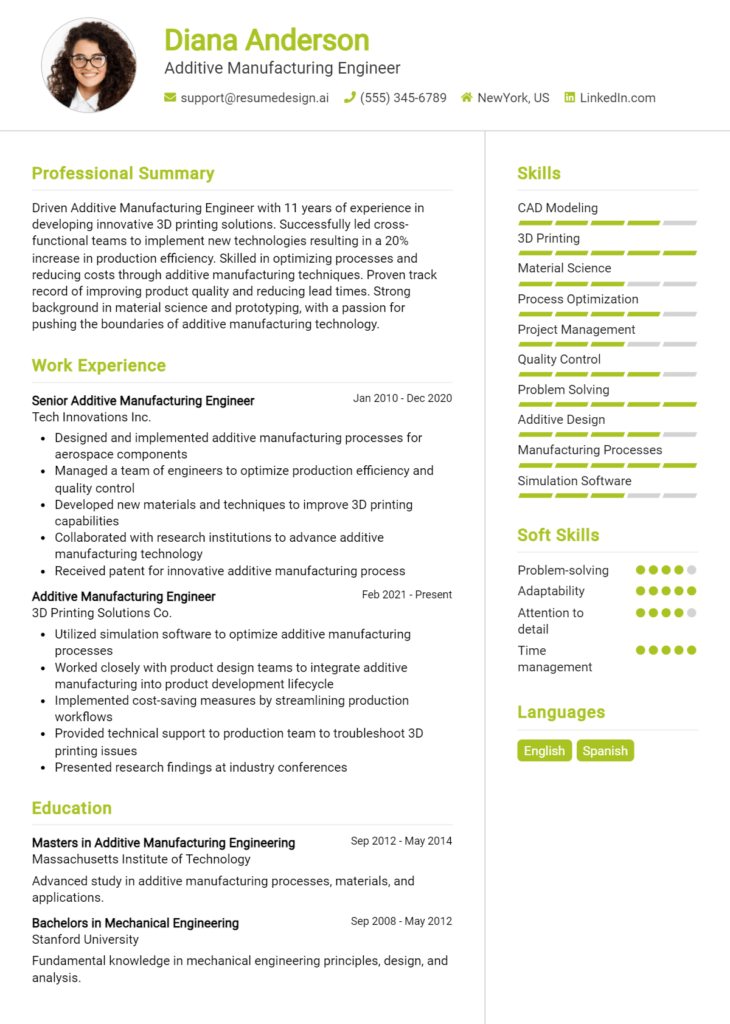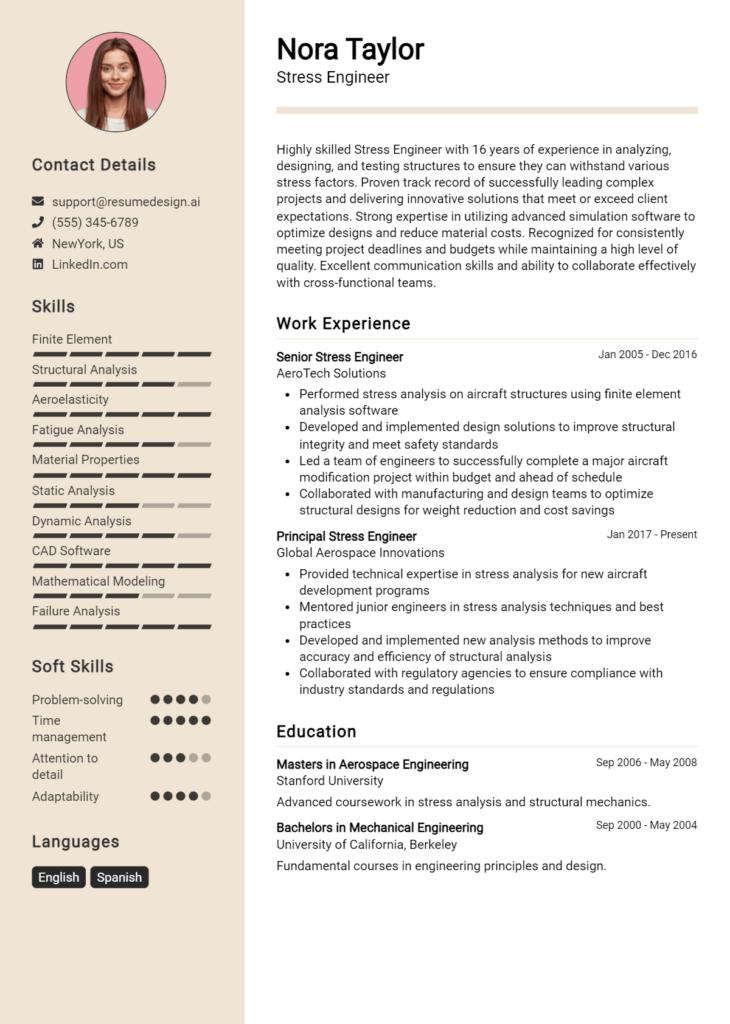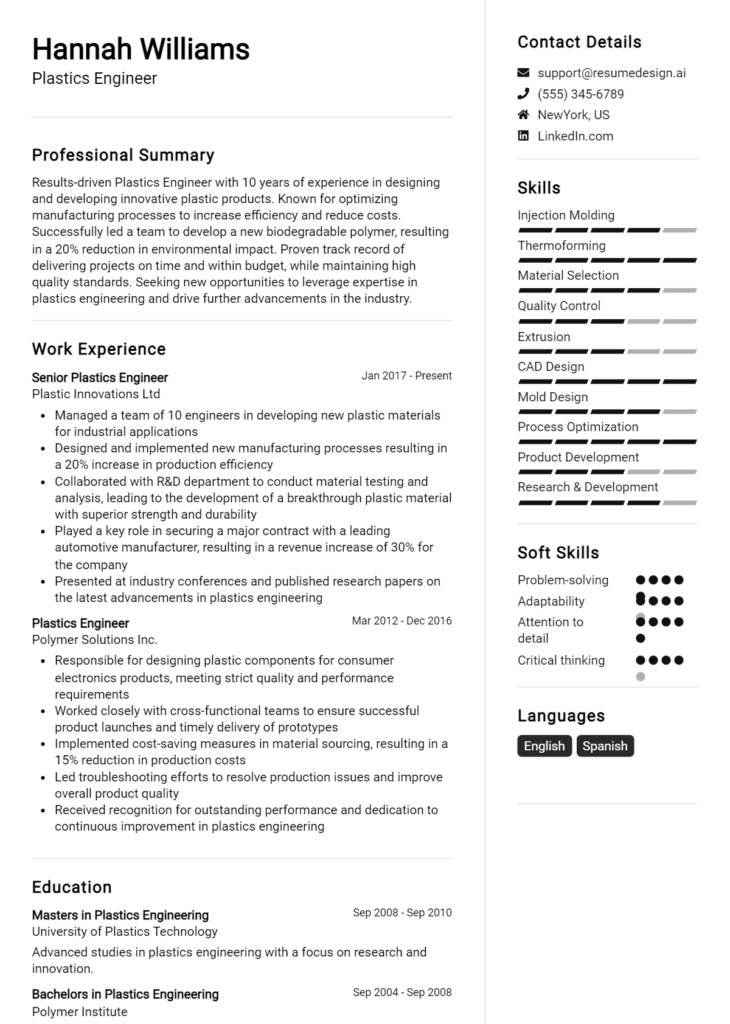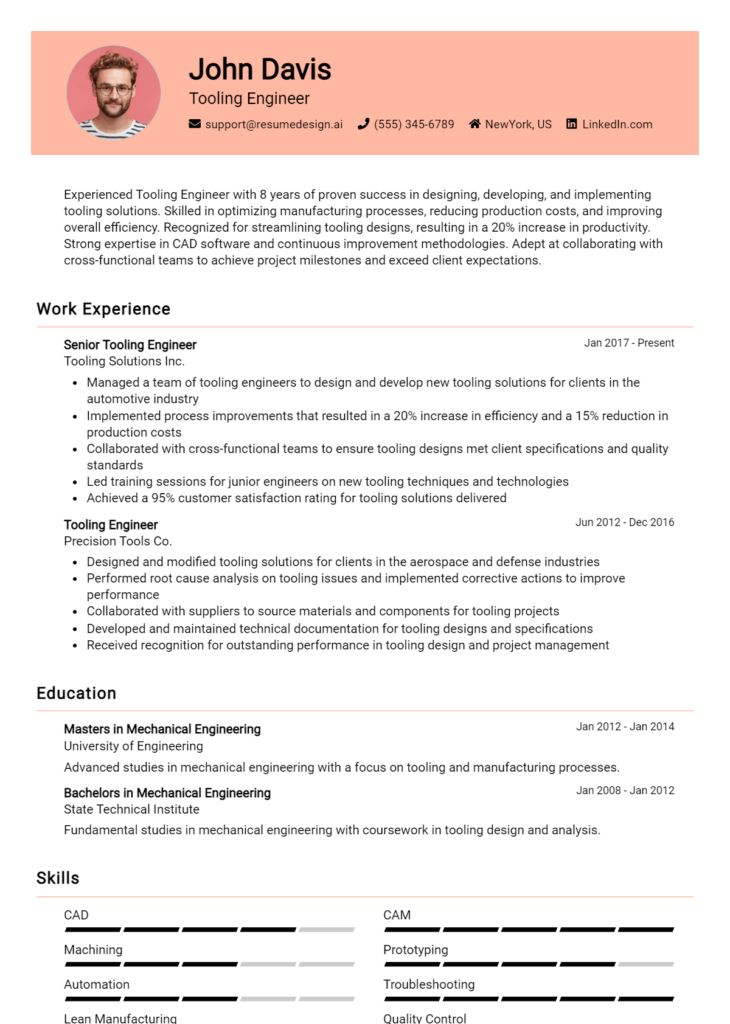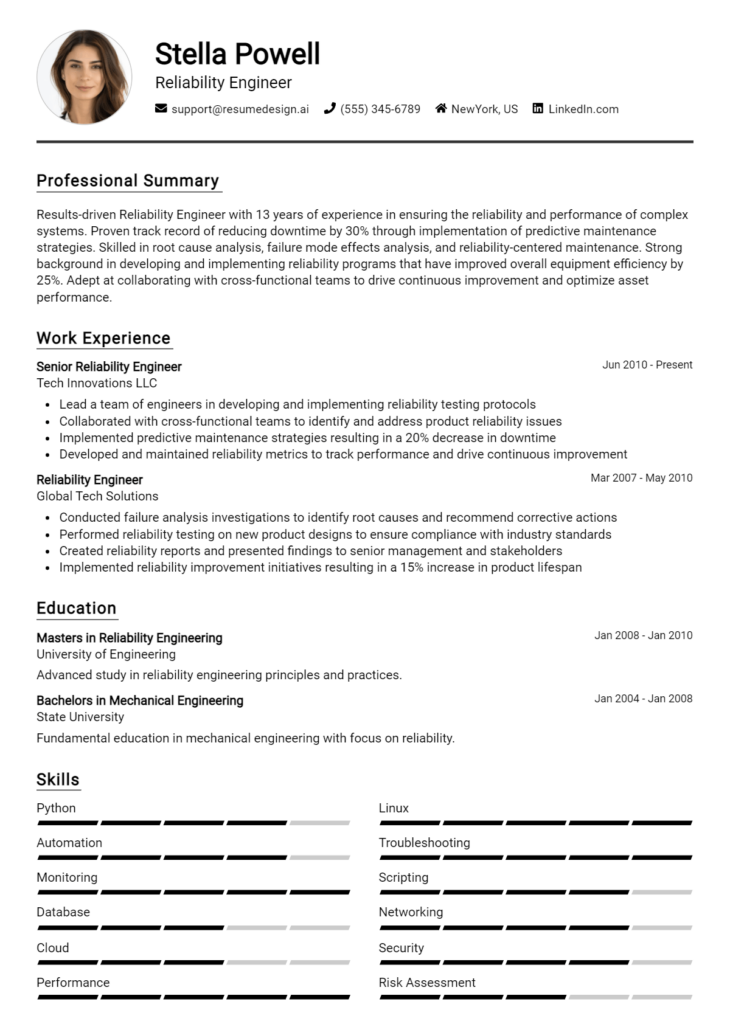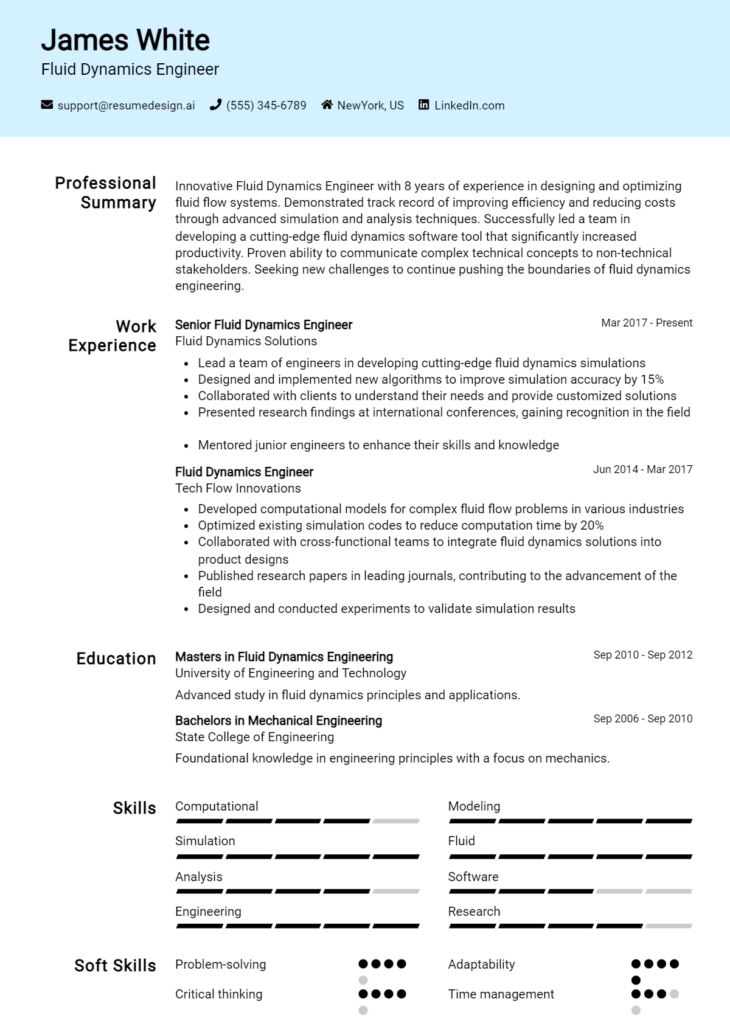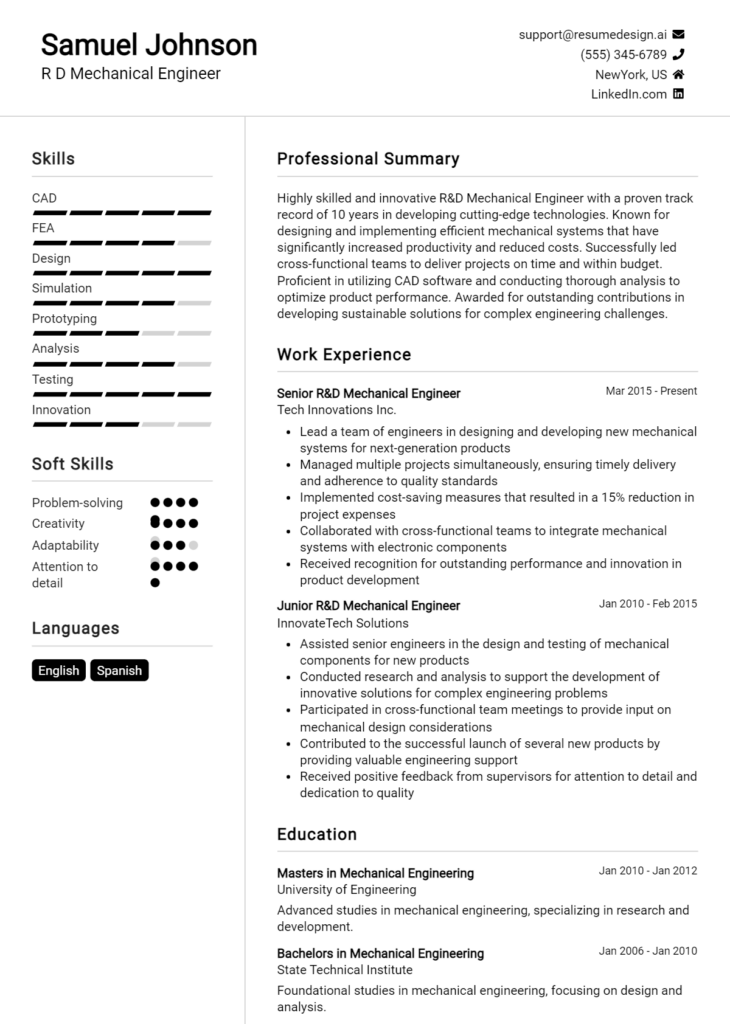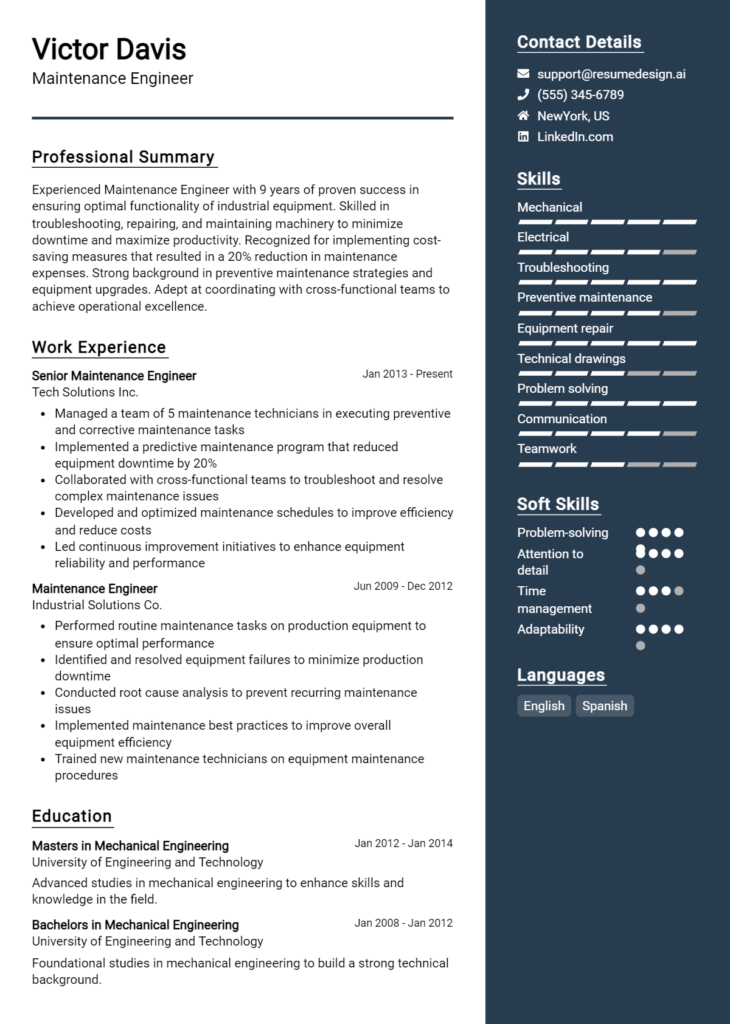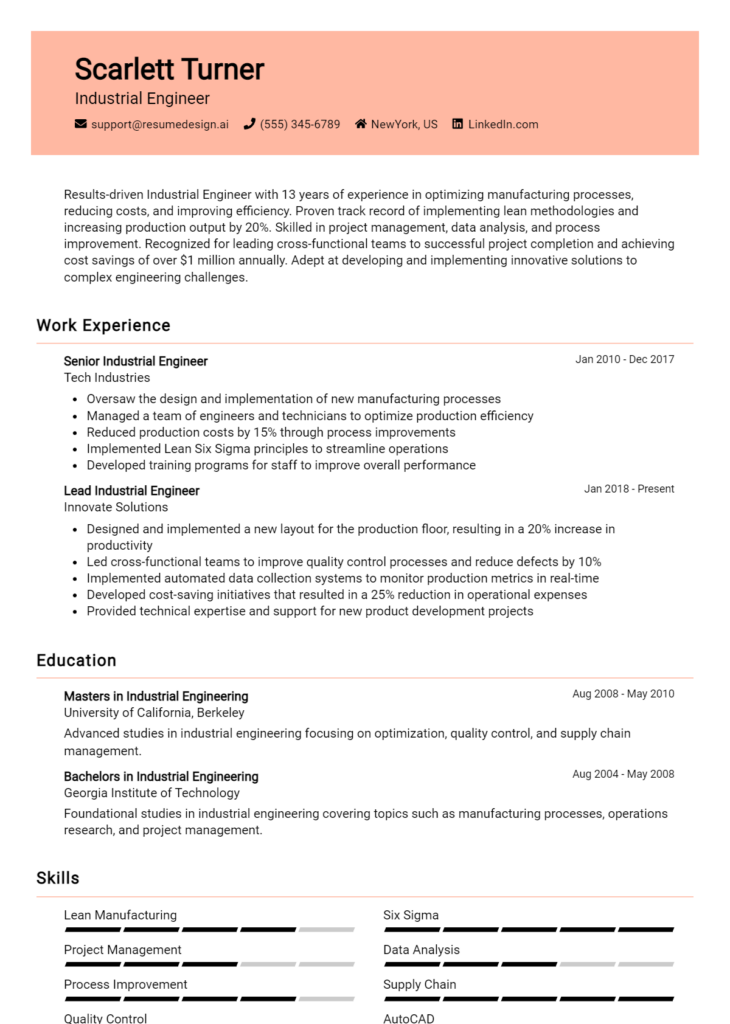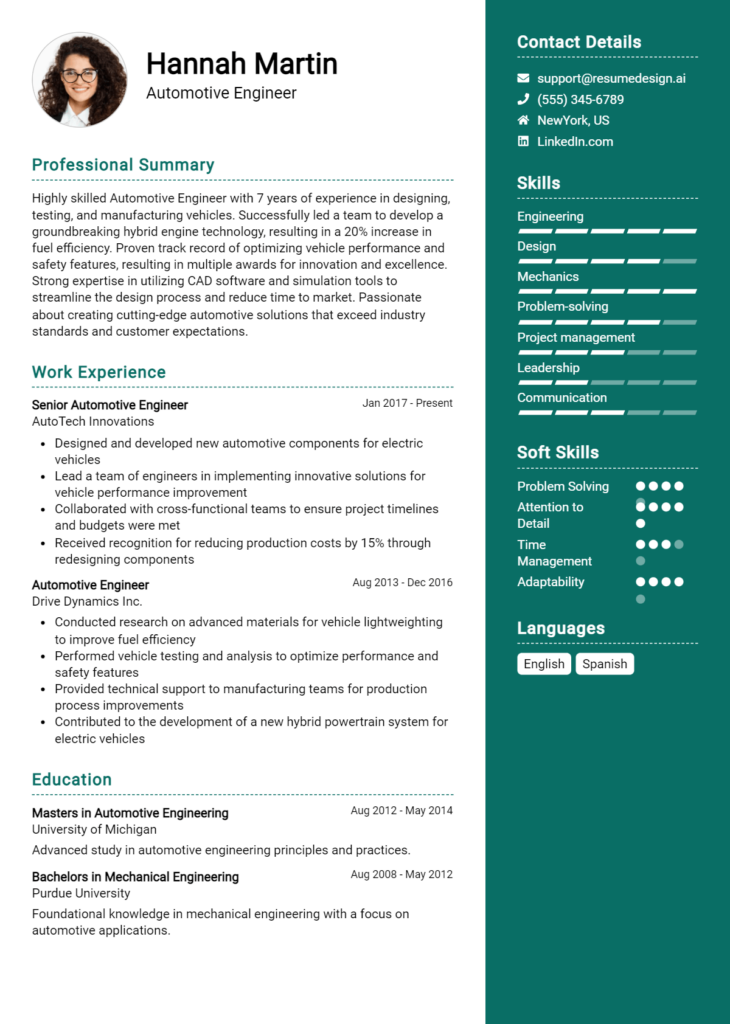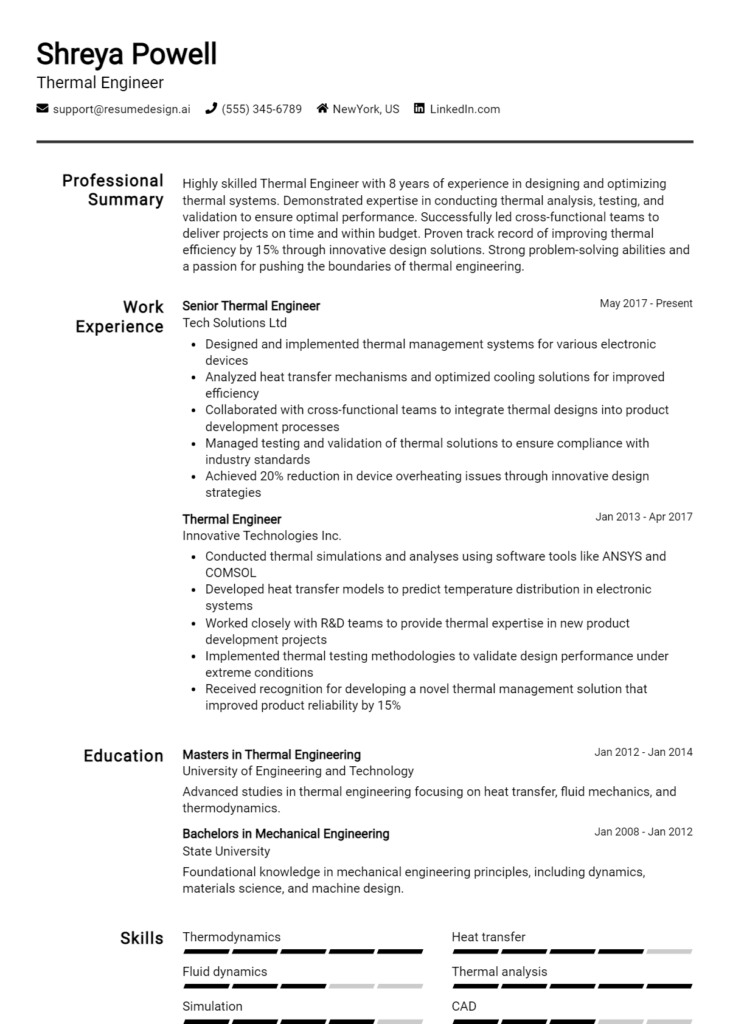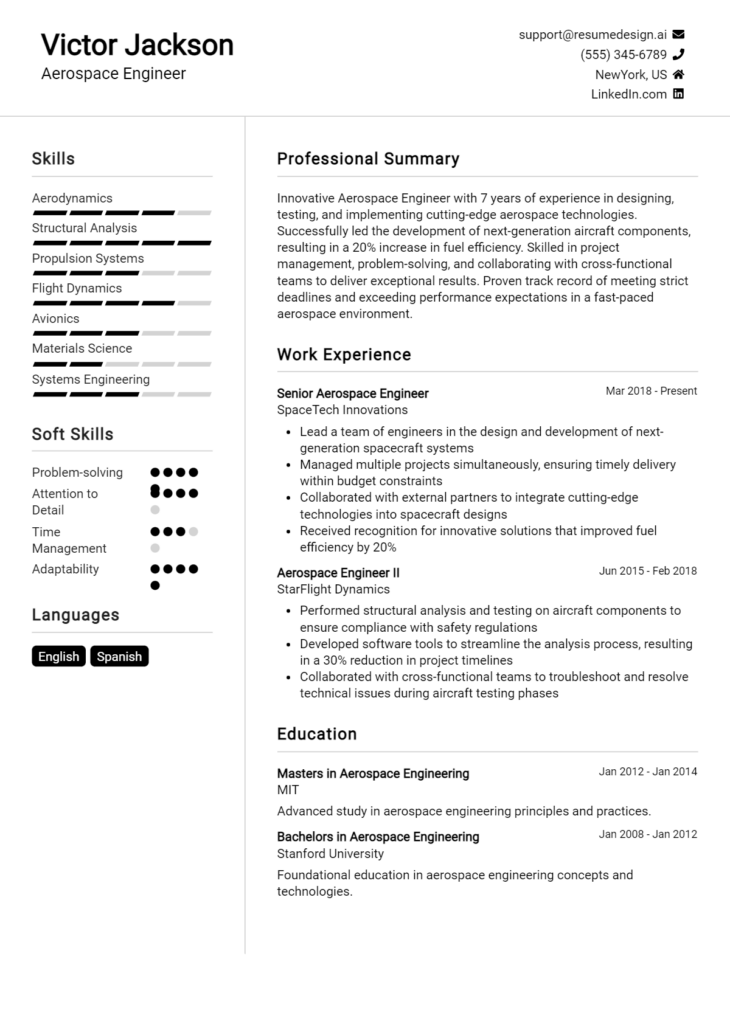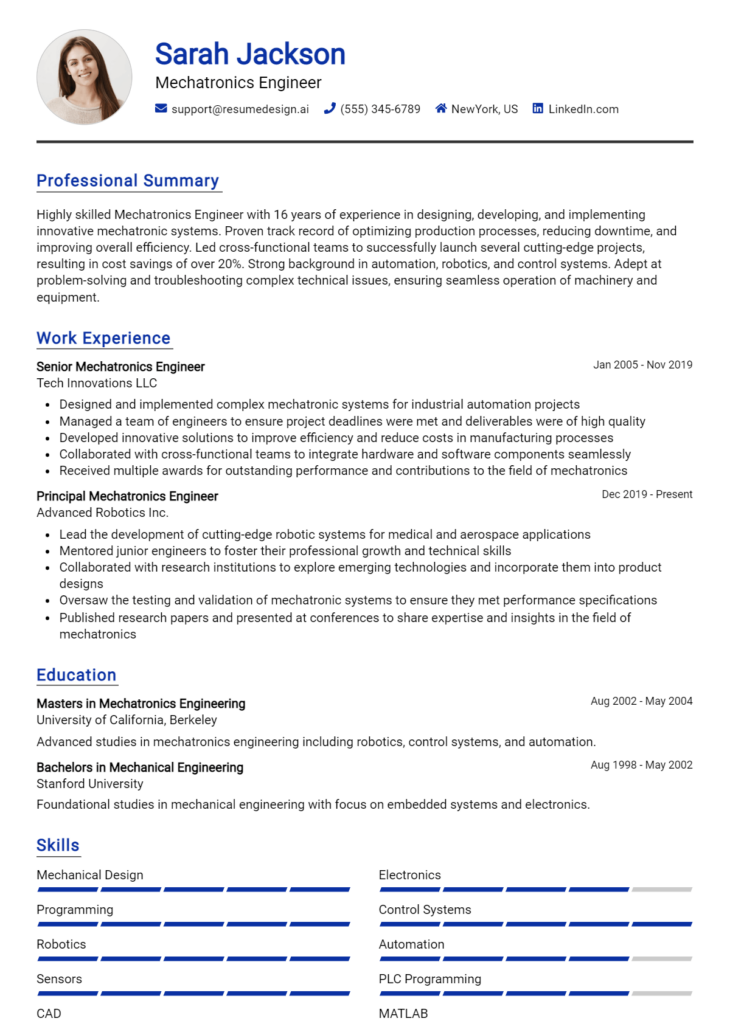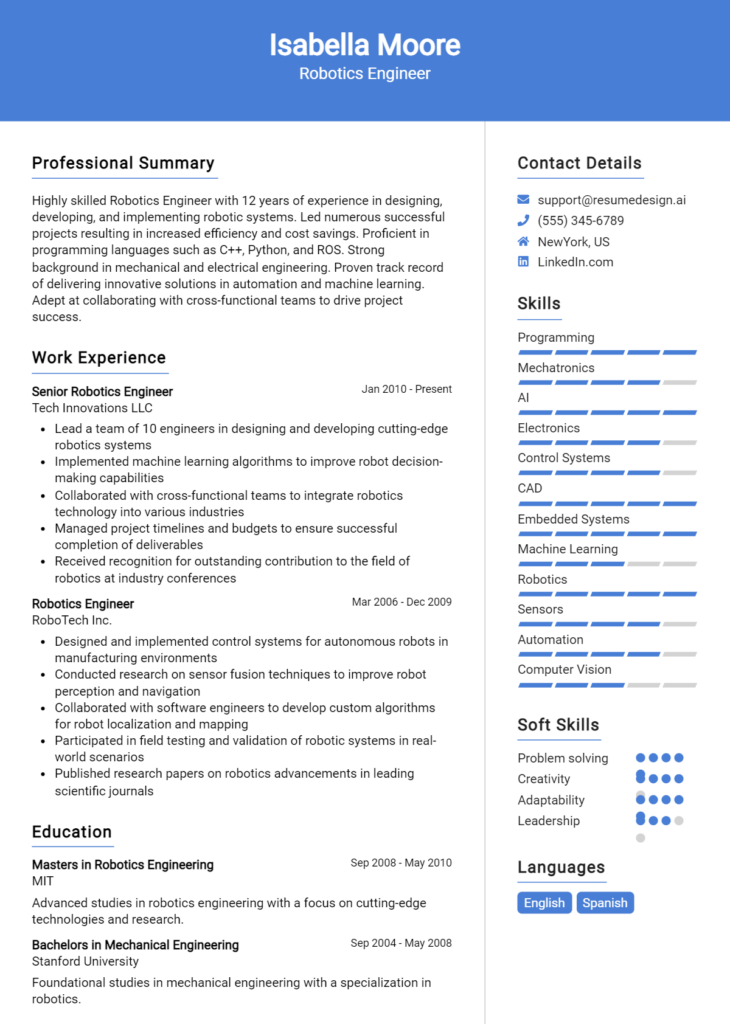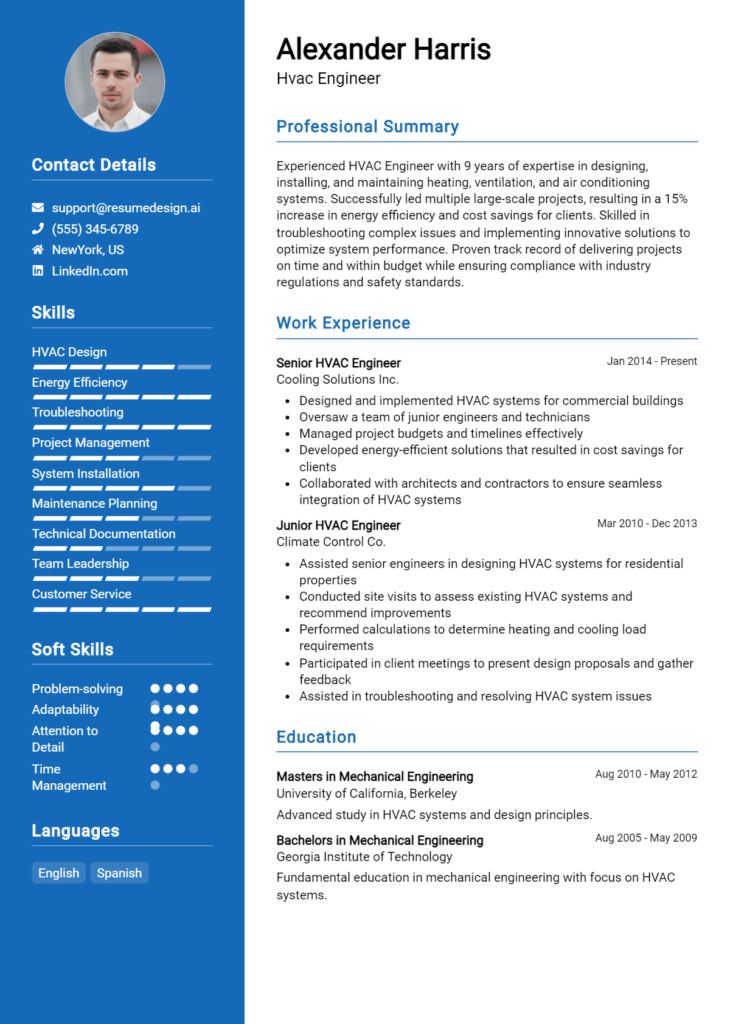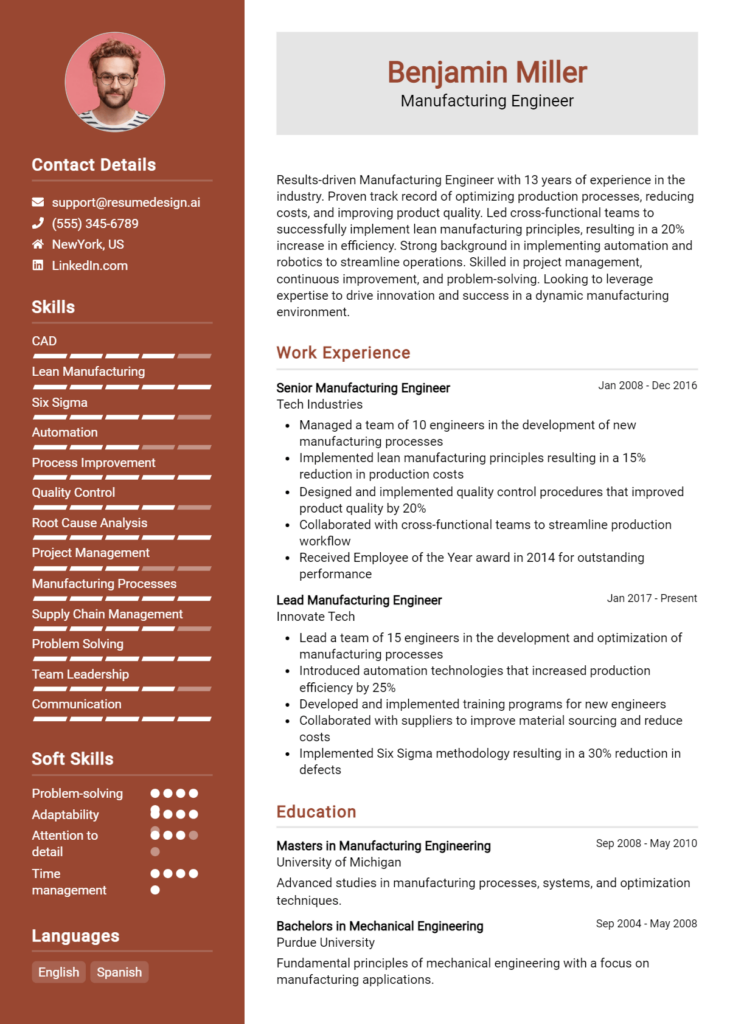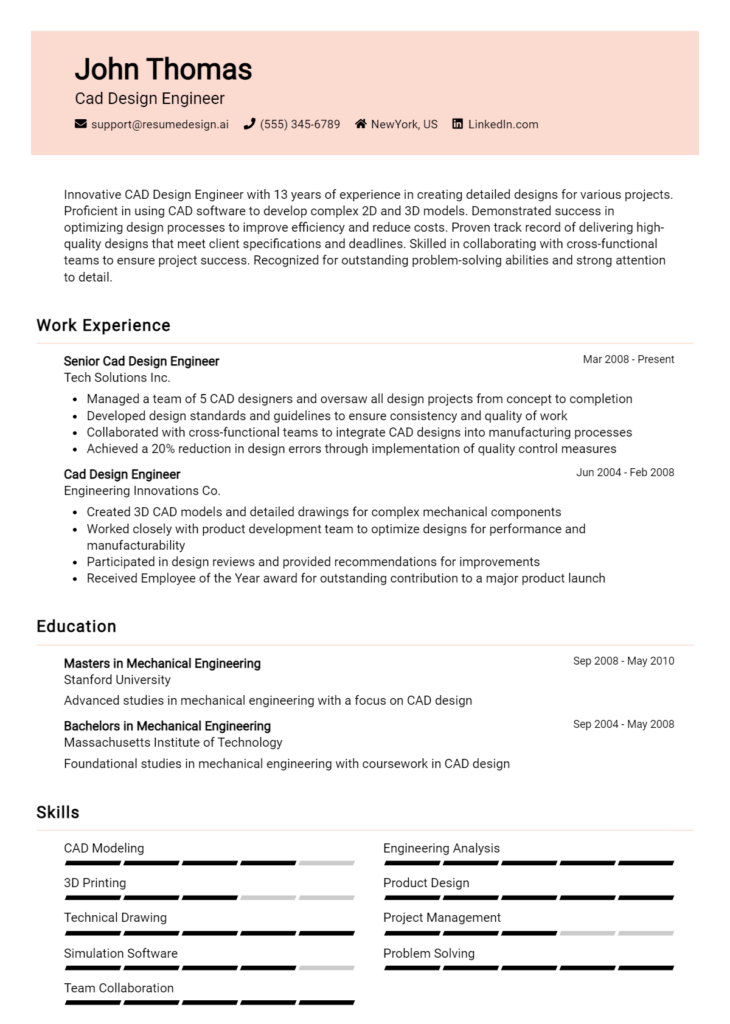Mechanical Engineer Core Responsibilities
A Mechanical Engineer plays a vital role in designing and developing mechanical systems, requiring a blend of technical, operational, and problem-solving skills. This professional collaborates across various departments, ensuring that engineering principles align with production, quality assurance, and project management goals. Their expertise aids in optimizing processes and enhancing product efficiency, directly impacting the organization's success. A well-structured resume that highlights these competencies is essential for showcasing a Mechanical Engineer's qualifications and contributions.
Common Responsibilities Listed on Mechanical Engineer Resume
- Design and analyze mechanical components and systems.
- Conduct feasibility studies and cost analysis.
- Collaborate with cross-functional teams to meet project objectives.
- Develop prototypes and oversee testing procedures.
- Ensure compliance with industry standards and regulations.
- Utilize CAD software for designing and modeling.
- Identify and troubleshoot engineering issues in production.
- Prepare technical documentation and reports.
- Implement process improvements for efficiency and safety.
- Conduct research to inform design decisions.
- Maintain project timelines and budgets.
- Provide technical support and guidance to team members.
High-Level Resume Tips for Mechanical Engineer Professionals
In today's competitive job market, a well-crafted resume is paramount for Mechanical Engineer professionals seeking to make a strong impression on potential employers. Your resume is often the first interaction a hiring manager has with you, serving as a powerful tool to showcase your skills, experiences, and achievements. It needs to reflect not only your technical abilities but also your accomplishments in a way that resonates with the specific demands of the job. This guide will provide practical and actionable resume tips specifically tailored for Mechanical Engineer professionals, ensuring that your qualifications stand out in a crowded field.
Top Resume Tips for Mechanical Engineer Professionals
- Tailor your resume to each job description, emphasizing relevant skills and experiences that match the specific requirements of the position.
- Use clear and concise language, focusing on technical terminology that is relevant to the mechanical engineering field.
- Highlight your engineering projects, detailing your role, the technologies used, and the outcomes achieved.
- Quantify your achievements with metrics whenever possible, such as cost savings, efficiency improvements, or project timelines.
- Include relevant certifications and licenses, such as a Professional Engineer (PE) license, to demonstrate your qualifications.
- Showcase your industry-specific skills, such as proficiency in CAD software or familiarity with industry standards and regulations.
- Incorporate a professional summary at the top of your resume that succinctly highlights your career goals and core competencies.
- Utilize action verbs to describe your responsibilities and achievements, creating a more dynamic and engaging narrative.
- Keep the layout clean and organized, using bullet points for easy readability and ensuring that important information stands out.
By implementing these tips, Mechanical Engineer professionals can significantly enhance their resumes, increasing their chances of landing a job in this competitive field. A polished resume that effectively showcases your skills and achievements can make all the difference in capturing the attention of hiring managers and securing that coveted interview.
Why Resume Headlines & Titles are Important for Mechanical Engineer
In the competitive field of mechanical engineering, a well-crafted resume headline or title is crucial for making a strong first impression on hiring managers. A powerful headline serves as a concise summary of a candidate's key qualifications, effectively grabbing attention and encouraging further review of the resume. It should encapsulate the essence of the candidate's expertise and relevance to the specific job being applied for. By being both concise and directly related to the position, an impactful headline can set the tone for the entire resume, highlighting the candidate's potential value to prospective employers.
Best Practices for Crafting Resume Headlines for Mechanical Engineer
- Keep it concise: Aim for one impactful phrase that summarizes your qualifications.
- Be role-specific: Tailor the headline to match the job description and requirements.
- Highlight key strengths: Focus on your most relevant skills, experiences, or accomplishments.
- Use industry keywords: Incorporate terms that are commonly recognized in the mechanical engineering field.
- Avoid jargon: Ensure the language is clear and accessible to non-technical hiring managers.
- Showcase achievements: If possible, include quantifiable results to demonstrate your impact.
- Maintain professionalism: Ensure the tone is formal and appropriate for the engineering industry.
- Update regularly: Revise your headlines to reflect the latest skills or experiences as you advance in your career.
Example Resume Headlines for Mechanical Engineer
Strong Resume Headlines
Innovative Mechanical Engineer Specializing in Product Development and Prototyping
Results-Driven Mechanical Engineer with 8 Years of Experience in Thermal Systems Design
Dynamic Mechanical Engineer with Proven Track Record in Project Management and Cost Reduction
Weak Resume Headlines
Mechanical Engineer Looking for Opportunities
Experienced Engineer
The strong headlines are effective because they precisely convey the candidate's expertise and value proposition, making it easy for hiring managers to see the fit for the role at a glance. They are specific, impactful, and tailored to the mechanical engineering field, showcasing the candidate's strengths. In contrast, the weak headlines fail to impress due to their vagueness and lack of specificity, leaving hiring managers without a clear understanding of the candidate's qualifications or suitability for the position.
Writing an Exceptional Mechanical Engineer Resume Summary
A resume summary is a critical component for Mechanical Engineers looking to make a lasting impression on hiring managers. This concise section serves as an elevator pitch, quickly capturing attention by highlighting key skills, relevant experience, and significant accomplishments that align with the job role. A strong summary not only showcases a candidate’s technical expertise but also emphasizes their ability to contribute to the company’s goals. Tailored specifically to the job applied for, an impactful resume summary sets the tone for the rest of the resume and can be the deciding factor in whether a candidate advances to the interview stage.
Best Practices for Writing a Mechanical Engineer Resume Summary
- Quantify achievements: Use specific numbers and metrics to demonstrate your impact in previous roles.
- Focus on skills: Highlight the most relevant technical and soft skills that match the job description.
- Tailor the summary: Customize each summary to reflect the requirements and keywords from the job posting.
- Be concise: Aim for 3-5 sentences that provide a snapshot of your qualifications without overwhelming the reader.
- Use action verbs: Start sentences with dynamic verbs to convey proactivity and results-oriented actions.
- Showcase industry knowledge: Mention familiarity with specific tools, technologies, or methodologies pertinent to mechanical engineering.
- Include certifications: If applicable, mention relevant certifications that enhance your credibility and expertise.
- Highlight teamwork and leadership: Emphasize your ability to collaborate with cross-functional teams or lead projects, showcasing interpersonal skills.
Example Mechanical Engineer Resume Summaries
Strong Resume Summaries
Results-driven Mechanical Engineer with over 8 years of experience in the automotive industry, specializing in CAD design and thermal analysis. Successfully led a project that improved engine efficiency by 15%, contributing to a cost savings of $300,000 annually.
Detail-oriented Mechanical Engineer with expertise in HVAC systems design and implementation. Proven track record in optimizing energy efficiency, achieving a 25% reduction in operational costs for a major commercial project.
Dynamic Mechanical Engineer with a strong background in product development and testing. Achieved a 30% increase in product reliability through innovative design modifications and rigorous testing protocols.
Weak Resume Summaries
Mechanical Engineer with experience in various projects. Skilled in engineering and looking for a new opportunity.
Dedicated engineer interested in mechanical design and development. Passionate about engineering and eager to contribute to a team.
The strong resume summaries are considered effective because they provide quantifiable results, specify relevant skills, and directly relate to the mechanical engineering role, making them impactful and tailored. In contrast, the weak summaries lack specificity, fail to include measurable achievements, and appear generic, which diminishes their effectiveness in grabbing the attention of hiring managers.
Work Experience Section for Mechanical Engineer Resume
The work experience section of a Mechanical Engineer resume is crucial as it serves as a platform to demonstrate a candidate's technical skills and their ability to manage teams effectively while delivering high-quality products. This section not only highlights relevant job roles and responsibilities but also emphasizes quantifiable achievements that align with industry standards. By showcasing specific results and contributions, candidates can differentiate themselves in a competitive job market and illustrate their capacity to add value to potential employers.
Best Practices for Mechanical Engineer Work Experience
- Focus on quantifiable results by including metrics and data to demonstrate impact.
- Use action verbs to describe responsibilities and achievements, making your contributions clear and dynamic.
- Align your experiences with industry standards and expectations to showcase relevance.
- Highlight technical expertise by detailing specific tools, software, and methodologies used.
- Demonstrate collaboration by mentioning teamwork and cross-functional projects.
- Include leadership roles and responsibilities, showcasing your ability to guide teams and projects.
- Tailor your experiences to match the job description of the position you are applying for.
- Maintain a clear and concise format to enhance readability and impact.
Example Work Experiences for Mechanical Engineer
Strong Experiences
- Led a cross-functional team in the design and implementation of a new HVAC system, resulting in a 30% increase in energy efficiency.
- Developed and optimized manufacturing processes that reduced production time by 25%, yielding an annual cost savings of $500,000.
- Managed a project that improved product reliability by 40%, enhancing customer satisfaction and reducing warranty claims.
- Collaborated with software engineers to integrate advanced simulation tools, increasing design accuracy and reducing prototyping costs by 15%.
Weak Experiences
- Worked on various engineering projects with no specific outcomes mentioned.
- Assisted in the design processes without detailing contributions or results.
- Participated in team meetings and discussions, but without highlighting any significant impact.
- Responsible for maintaining equipment, but lacking information on improvements or efficiencies achieved.
The examples categorized as strong experiences stand out due to their emphasis on quantifiable outcomes, clear technical leadership, and collaborative efforts that resulted in measurable improvements. In contrast, the weak experiences lack specific details and fail to convey any significant contributions or achievements, rendering them less impactful in the context of a resume. Highlighting concrete results and responsibilities is essential for making a resume compelling and memorable.
Education and Certifications Section for Mechanical Engineer Resume
The education and certifications section of a Mechanical Engineer resume plays a crucial role in establishing the candidate's qualifications and expertise in the field. This section not only highlights the academic background of the applicant but also showcases industry-relevant certifications and ongoing learning efforts. By providing details about relevant coursework, specialized training, and recognized credentials, candidates can significantly enhance their credibility and demonstrate their alignment with the specific requirements of the job role. A well-structured education and certifications section can articulate the candidate’s commitment to professional development and their preparedness to contribute effectively to potential employers.
Best Practices for Mechanical Engineer Education and Certifications
- Include only relevant degrees and certifications that pertain to mechanical engineering.
- Provide specific details such as graduation dates and institutions to enhance credibility.
- List advanced degrees or specialized certifications that demonstrate a higher level of expertise.
- Incorporate relevant coursework that showcases your skills and knowledge applicable to the job.
- Highlight certifications from recognized industry organizations (e.g., ASME, SAE).
- Use clear formatting for easy readability, ensuring important information stands out.
- Keep the section concise and focused, avoiding unnecessary details that may detract from key qualifications.
- Update the section regularly to reflect any new certifications or training completed.
Example Education and Certifications for Mechanical Engineer
Strong Examples
- Bachelor of Science in Mechanical Engineering, ABC University, Graduated May 2022
- Certified SolidWorks Professional (CSWP), SolidWorks, 2023
- Master of Science in Mechanical Engineering with a focus on Thermal Systems, XYZ University, Expected Graduation December 2024
- Fundamentals of Engineering (FE) Certification, National Council of Examiners for Engineering and Surveying, 2021
Weak Examples
- Associate Degree in General Studies, DEF Community College, Graduated 2018
- Certification in AutoCAD Basics, 2015 (not industry-recognized)
- High School Diploma, GHI High School, Graduated 2016
- Outdated certification in Mechanical Drafting, 2010
The strong examples are considered effective because they are relevant, up-to-date, and specifically tailored to the field of mechanical engineering. They highlight educational achievements and certifications that are recognized in the industry, showcasing the candidate's qualifications and commitment to professional development. Conversely, the weak examples lack relevance to the mechanical engineering field, featuring outdated or general qualifications that do not enhance the candidate's profile in the context of the desired job role.
Top Skills & Keywords for Mechanical Engineer Resume
As a Mechanical Engineer, showcasing the right skills on your resume is crucial for standing out in a competitive job market. Employers seek candidates who not only have technical expertise but also possess the soft skills necessary for effective teamwork and communication. A well-crafted resume that highlights these skills not only demonstrates your qualifications but also indicates your potential to contribute positively to a company's objectives. By focusing on both hard and soft skills, you can create a comprehensive representation of your capabilities, making it easier for hiring managers to envision you in their organization. For more insights into how to effectively present your skills, visit our skills page.
Top Hard & Soft Skills for Mechanical Engineer
Soft Skills
- Problem-solving
- Communication
- Teamwork
- Time management
- Adaptability
- Attention to detail
- Creativity
- Critical thinking
- Leadership
- Project management
Hard Skills
- CAD software proficiency (e.g., AutoCAD, SolidWorks)
- Finite element analysis (FEA)
- Thermodynamics
- Fluid mechanics
- Materials science
- Manufacturing processes
- Mechanical design
- Prototyping and testing
- Robotics
- HVAC systems
These skills reflect a blend of technical knowledge and interpersonal abilities essential for a successful career in mechanical engineering. For guidance on how to highlight your work experience, consider emphasizing these skills in the context of your previous roles and projects.
Stand Out with a Winning Mechanical Engineer Cover Letter
I am writing to express my interest in the Mechanical Engineer position at [Company Name] as advertised on [where you found the job listing]. With a Bachelor’s degree in Mechanical Engineering and over [X years] of hands-on experience in designing, analyzing, and optimizing mechanical systems, I am excited about the opportunity to contribute to your innovative projects. My background in [specific area, e.g., HVAC systems, product development, or robotics] aligns well with the requirements of this role, and I am eager to bring my technical skills and creative problem-solving abilities to your esteemed team.
In my previous role at [Previous Company Name], I successfully led a project that involved the redesign of a key component of our manufacturing process, which resulted in a [quantifiable outcome, e.g., 20% reduction in production costs]. I utilized advanced CAD software to create detailed designs and simulations, ensuring product viability and efficiency while adhering to all safety and quality standards. My collaborative approach enabled me to work effectively with cross-functional teams, including electrical engineers and production staff, to ensure seamless project execution.
I am particularly drawn to [Company Name] because of its commitment to innovation and sustainability in mechanical design. I admire your recent projects, such as [specific project or initiative], and I am enthusiastic about the possibility of contributing to similar initiatives that push the boundaries of engineering solutions. My passion for continuous learning and professional development drives me to stay updated with the latest industry trends and technologies, ensuring that I can offer fresh perspectives and innovative ideas to your team.
Thank you for considering my application. I am looking forward to the opportunity to discuss how my background, skills, and enthusiasms align with the goals of [Company Name]. I am excited about the possibility of contributing to your team and am eager to provide further insights during a personal interview. Please feel free to contact me at [your phone number] or [your email address] to arrange a convenient time to meet.
Common Mistakes to Avoid in a Mechanical Engineer Resume
When crafting a resume for a Mechanical Engineer position, it's crucial to present a clear, compelling, and professional document that highlights your skills and experiences. However, many candidates make common mistakes that can detract from their qualifications and reduce their chances of landing an interview. Below are several pitfalls to avoid when creating your Mechanical Engineer resume:
Generic Objective Statement: Using a vague objective statement that lacks specificity can make your resume sound generic. Tailor your objective to the specific role and company to demonstrate your genuine interest.
Overloading with Technical Jargon: While it's important to showcase your technical skills, using excessive jargon can confuse recruiters. Ensure that your language remains accessible and relevant to the job description.
Neglecting Soft Skills: Focusing solely on technical abilities can lead to an incomplete picture of your capabilities. Highlight soft skills such as teamwork, communication, and problem-solving, which are essential in engineering roles.
Inconsistent Formatting: An unprofessional layout can distract from your qualifications. Use a consistent format for headings, fonts, and bullet points to ensure your resume is easy to read and visually appealing.
Listing Responsibilities Instead of Achievements: Simply listing job responsibilities can make your experience seem mundane. Focus on measurable achievements and the impact of your work to demonstrate your value to potential employers.
Ignoring Keywords from the Job Description: Failing to incorporate keywords from the job posting can hurt your chances of passing through Applicant Tracking Systems (ATS). Tailor your resume to include relevant terms that reflect the skills and experiences the employer is seeking.
Omitting Relevant Projects: If you've worked on significant projects or research, be sure to include them, especially if they relate to the job you're applying for. Highlighting relevant projects can set you apart from other candidates.
Using an Unprofessional Email Address: An unprofessional email can give a poor first impression. Use a simple, professional email address that includes your name to maintain a polished image.
Conclusion
As we explored the essential skills and qualifications required for a successful career as a Mechanical Engineer, it is clear that a well-crafted resume is a vital tool in showcasing your expertise and experience. We discussed the importance of highlighting technical skills, relevant certifications, and project experiences that align with job requirements. Additionally, networking and continuous learning were emphasized as crucial elements for career advancement in the engineering field.
Now that you have a comprehensive understanding of what makes a standout Mechanical Engineer resume, it's time to take action! Review your current resume to ensure it effectively communicates your qualifications and achievements. If you're looking for inspiration or assistance, consider utilizing the following resources:
- Explore various resume templates tailored to Mechanical Engineers.
- Create a professional document easily with our resume builder.
- Check out resume examples that can guide you in structuring your own.
- Don't forget the importance of a compelling introduction; utilize our cover letter templates to make a great first impression.
Invest the time to refine your resume and cover letter today, and put your best foot forward in your Mechanical Engineering career!

